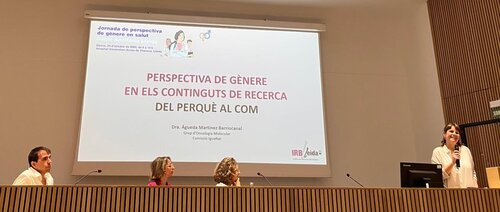The IRBLleida Equality Commission, at the Conference on Gender Perspective in Health in the Lleida Health Region
To incorporate the gender perspective at all levels of care in the health system to ensure quality and more equitable healthcare
The chair of the IRBLleida Equality Commission, Águeda Martínez, took part in the Conference on Gender Perspective in Health in the Lleida Health Region. Gender inequalities have a direct impact on people's health and well-being. For this reason, the Department of Health considers it a priority to incorporate the gender perspective at all levels of the health system to ensure quality and more equitable healthcare. With the aim of promoting this practice, the Lleida Health Region held a conference on gender perspective in health at the Arnau de Vilanova University Hospital (HUAV), where a hundred health professionals filled the auditorium to share experiences and tools that promote more inclusive care.
Martínez reviewed the historical, cultural and structural causes for which women's health has been ignored, distorted or undervalued. These factors have contributed to a gender gap in health, with women estimated to live 25% more of their lives in poor health compared to men. She also argued that the way to close the gap to improve equity and quality of care is to incorporate sex and gender into research content, clinical protocols and health education. With regard to research, she spoke of different resources that help research staff to define sex- and gender-sensitive research concepts and questions, and to determine whether methodologies, data collection and analysis, and the presentation and communication of results are carried out with a gender perspective.
Shared experiences and challenges
The day began with a presentation by Ana Burgos, coordinator of the Malva Project run by the Health and Community Foundation, which aims to incorporate a gender perspective into the approach to drug use. Burgos pointed out that specific actions need to be designed and implemented, such as disaggregating data by sex, establishing gender indicators to facilitate evaluation, and training professionals in feminist gender theories.
The session continued with a round table discussion on experiences in the region, which highlighted the importance of this gender perspective in areas as diverse as nutrition throughout women's lives, biomedical research and the approach to cognitive impairment. Participants included Mercè Carbonell, dietitian-nutritionist at the Primary Care Teams in Les Borges Blanques, Tàrrega and Bellpuig; Águeda Martínez, chair of the IRBLleida Equality Commission; and Gerard Piñol, head of the Cognitive Disorders Unit at Santa Maria University Hospital.
Next, Teresa Pont, coordinator of the Clinical Health and Gender Committees of the Department of Health, discussed the multiple gender biases that exist in both healthcare and research and the consequences they generate, concluding by emphasising the importance of the Clinical Health and Gender Committees as a driving force for change to correct current inequalities in health.
Finally, M. Antònia Mangues, coordinator of the Management Committee of the Catalan Society for Health with a Sex and Gender Perspective, highlighted the challenge of systematically incorporating the sex and gender perspective into research, clinical practice and service management, an essential transformation because, she said, 'until now we have forgotten half the population.'

Round table discussion on experiences in the region






